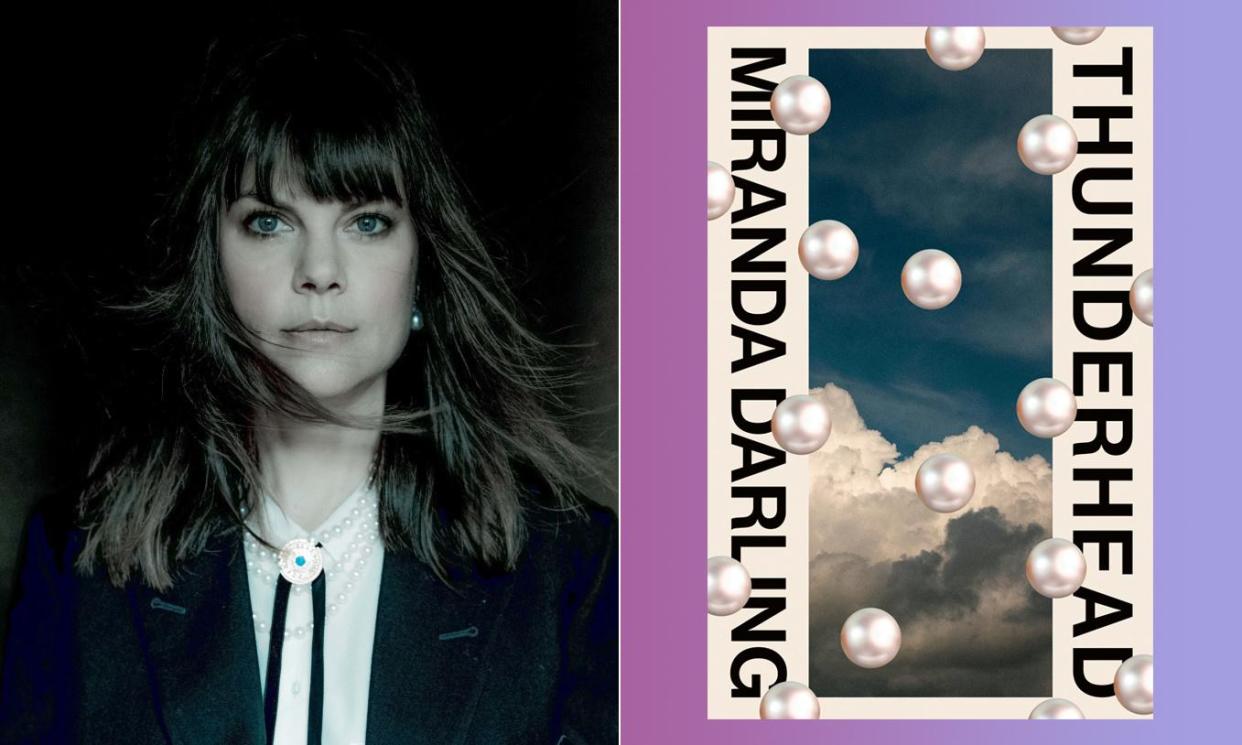Thunderhead by Miranda Darling review – pacy Sydney thriller hits a superficial note

Miranda Darling’s short novel opens with an epigraph from Virginia Woolf’s To the Lighthouse, about life’s “little daily miracles”. Like Mrs Dalloway, another of Woolf’s novels, Thunderhead is set over the course of a single day and follows a wealthy woman preparing for a dinner party. Darling’s narrator, Winona Dalloway, even shares her surname.
Per the jacket copy, Winona is “seemingly unremarkable”: she is tanned, slender and tastefully dressed; a woman brightly devoted to her two sons, balancing the domestic pressures of a “motherwifeperson” in the leafy harbourside “suburbs of the east” (almost definitely Sydney) against the pull of a more questing, private self. The story unfolds through her inner monologue, a voice spilling over with abundant vocabulary, title case and Theories About Life. But in her outer world, the reader soon implies, something is out of kilter.
Related: The Work by Bri Lee review – satirical art world romp tries to tick too many boxes
Other selves interject: there’s “the cynical voice, the voice of Hard Truths”; there’s a calmer, gentler alter ego, reminding her who she is; and winsome lists dappled throughout give way to a dark undertow (“BOUNDARIES THAT SHOULD NOT BE CROSSED, BY WINONA DALLOWAY”, for instance). Winona is idealistic, ebullient, and very stressed. Because running through the book – the titular Thunderhead, building alongside the literal weather – is the current of coercive control.
Winona’s husband, “a local Figure of Note in the Community” referred to only as “Him”, keeps tabs on her through a ceaselessly active Google calendar, and bombards her with texts, possibly even a skywriter. Ambiguously shadowy things have happened to his first two wives and in an act of self-preservation, Winona, once a nebulous sort of government-level global security analyst, has retreated to a less ego-threatening profession: romance writing. (Here, Darling deploys an unsubtle meta Trojan horse: Winona’s own novel is also about a woman trying to leave a miserable relationship.)
In the lead-up to dinnertime, “He” intrudes on Winona in increasingly aggressive and sinister ways – revealing the anxious narration of her day to be not so much playful whimsy as the sliding doubt and panic of a person bullied out of all trust in herself. Her universe has narrowed to something shallow and alienating, and she torments herself for what she fears is her complicity in its shrinking. (This, especially, is painfully believable.) Menacing details emerge about the ways “He” asserts himself against her and their children, his “breathtaking” attempts to gaslight her into smaller and smaller corners. These moments, genuinely oppressive, build to a frightening climax – here, the book’s tight structure and pacing really work.
But there’s a tonal issue. The breathless lifestyle commentary as Winona rolls between appointments and school pickup (the scent of a flower; escapades with “the Small Ones”) is intercut with non-specific asides on global terror, unilluminating references to her well-travelled “life before the suburbs’’ (“an ancient university”, a host of glamorous friends), and scathing observations on the values of those around her. On one hand, this mix is undoubtedly in conversation with To the Lighthouse. But here, unanchored by the melancholy power of Woolf’s limpid social observation, the effect of putting all these things side by side in such short order is to render each of them superficial.
The idea that anyone can be locked into an abusive dynamic, even someone with Winona’s seemingly rich life, is unassailably important. By centring the novel on this struggle, and with the casual seasoning of international affairs lent weight by her own professional background (adjunct scholar specialising in security threats), Darling lays claim to a high-stakes moral seriousness. Yet it feels somehow one-dimensional, and this may be where the book’s length works against it.
For a narrator to opine, wide-eyed, about a suicide bomber’s surprising lack of “gentleness” and then get back to atmospherically describing their cooking in a seaside house they’ve bought with their “grandmother’s legacy” is almost offensively glib. If this is the “black comedy” promised on the jacket copy, it doesn’t land for me. It’s a version of politics that seems to begin and end at self-actualisation.
Winona’s “constantly fracturing” realities add more uncertainties. Is she a traumatised woman in the throes of delusion? A poetically minded girl-boss chasing emancipation? Is it all actually a satire about the cognitive dissonance of contemporary life? It’s not clear – and the book suffers from the confusion.
In the novel Winona is writing, she names her fictional heroine Nora, a nod to the famous trapped wife of Ibsen’s A Doll’s House. The triumph of that play, AS Byatt wrote, “is that it asks us to care for a small-minded person” (and maybe even her terrible husband). But A Doll’s House, as Byatt points out, takes enormous interest in how its characters, even the unpleasant ones, are shaped by their times.
Winona is incurious about other people. In a way, this is inevitable: she is caught in a distressing cul-de-sac, afraid for herself, and, more urgently, her children. But if the reader is simultaneously meant to see her as a source of profound wisdom, this blind spot becomes more serious. Of course I was compelled to cheer on her efforts to escape her husband, to remind herself “there is more than one way of living”. But all the ways glancingly conveyed in this book, the good and the bad, seem equally trite.
Thunderhead by Miranda Darling is out now through Scribe


